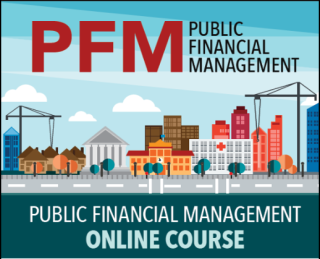
Posted by Fabien Gonguet[1]
The Fiscal Affairs Department relaunched its online course on Public Financial Management (PFM) on May 1, 2020, to remain open year-round. In its three previous offerings, this free course has been taken by nearly 5,000 participants from virtually every country, with very high satisfaction rates. Developed and taught by more than 15 experts of the Fiscal Affairs Department, the course is open for government officials and staff of bilateral and multilateral development agencies, but also to civil society organizations, parliamentarians, academics and the general public, which represent 3 out of 10 active participants.
New in this 2020-2021 edition of the course is a page on “PFM and COVID-19” which will be updated periodically. And a brand-new video has been added to the course (see below).
82 percent of participants in the course have praised its self-paced nature. Some participants may wish to complete the whole course and obtain a certificate (the success rate reached 60 percent in the previous offering), while others may want to focus on a selection of modules and topics. The course also offers the opportunity for IMF missions and experts in the field to make use of its materials in preparing or delivering capacity development activities. The course has proven to be an excellent resource for low-capacity countries – last year, one in five participants came from a fragile state.
What is the PFM online course about?
The course provides an overview of PFM systems, institutions, and capacity building in developing and emerging market economies. It focuses on PFM issues based on the IMF’s operational and analytical perspectives, in support of macroeconomic stability, inclusive growth, achievement of the Sustainable Development Goals (SDGs), and good governance. The training covers a wide range of topics and treats PFM as an integrated system. As such, it focuses on PFM priorities, reform objectives and implementation risks. Built around 15 modules, the course covers both conceptual and practical approaches, and includes testimonies from ministers of finance, central bank governors, practitioners, and civil society organizations. It also includes resources on how PFM systems can help governments tackle the economic and fiscal effects of the COVID-19 pandemic. Each module contains assessments that need to be taken in order to obtain a certificate (passing grade is 60 percent). The course requires 40 to 50 hours of self-paced work.
What are the objectives of the course?
In this course, you will:
- Understand why PFM is an important tool to implement public policies.
- Describe and analyze the budget cycle, and its main components.
- Identify the linkages between the components of PFM systems and improved economic and fiscal performance.
- Evaluate a simple medium-term budget framework, a cash management plan, and a public investment management reform strategy.
- Recognize tools for the effective management of fiscal risks, components of fiscal transparency, reliable fiscal reports, and internal and external audits.
- Identify issues relevant to the prioritization and sequencing of PFM reforms, and the challenges faced in implementing such reforms.
- Understand the importance of local conditions and political institutions in designing and implementing reforms.
Is the PFM online course for you?
Anyone with an interest in public finances, budget transparency and government accountability should take the course! The course is particularly relevant for mid- to senior-level officials in ministries of finance, treasuries, debt management offices, ministries of economy, or planning or financial management divisions in line ministries. It is also targeted at professionals involved in capacity strengthening functions related to PFM. The training is designed for participants who have already a basic understanding of PFM systems and builds on that knowledge at an intermediate level. Here are a few testimonies from course alumni:
“high-quality, entertaining, useful and timely – a very important initiative” – Juan Pablo Guerrero, Global Initiative for Fiscal Transparency.
“an incredible bank of knowledge on understanding PFM and how to utilize it within any country context” – participant from Tajikistan.
“a truly rewarding and enlightening course” – participant from Malawi.
How to register for the course?
If you are a government official or work for a development agency please use this link to register. By registering on the IMF course platform, you will be able to get a FREE certificate when you complete the course.
If you are from a civil society organization or are NOT affiliated with a government organization, please register directly on the edX platform, by using this link.
For a full list of IMF online courses please go to www.imf.org/moocs.
For the full catalog of 2020 IMF online courses available on EdX, please click here.
[1] Fiscal Affairs Department, IMF.
Note: The posts on the IMF PFM Blog should not be reported as representing the views of the IMF. The views expressed are those of the authors and do not necessarily represent those of the IMF or IMF policy.





